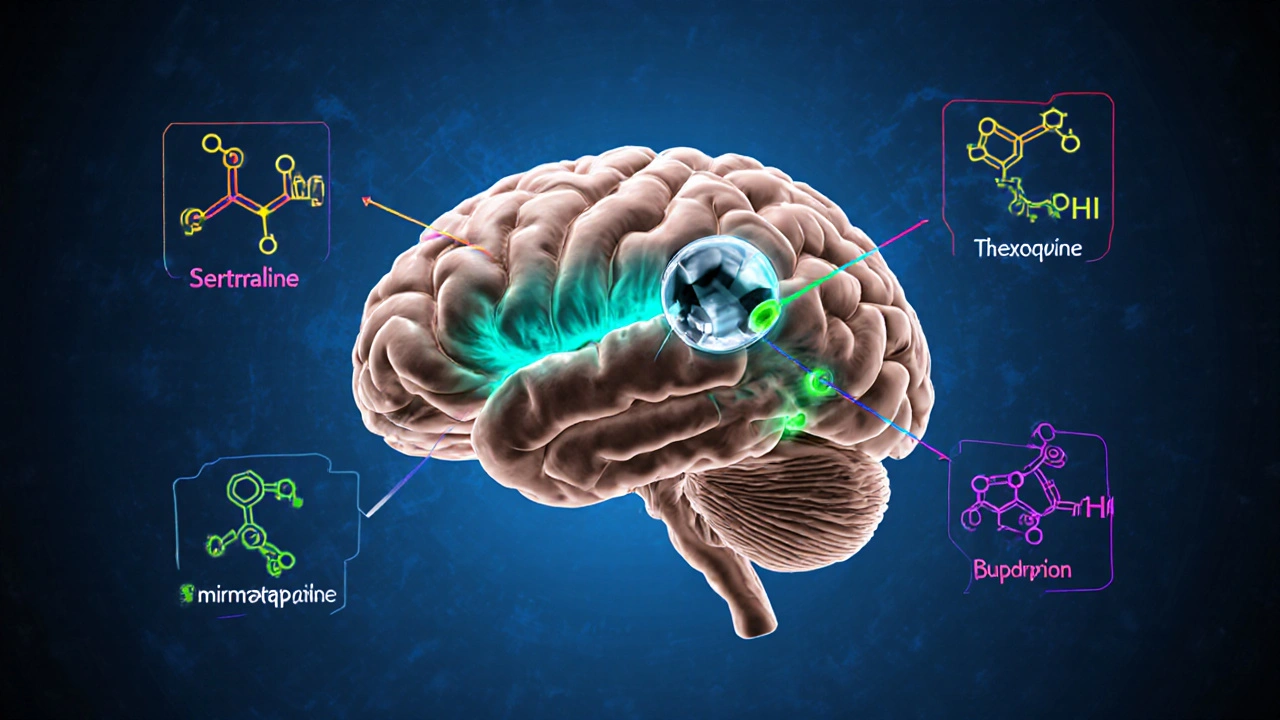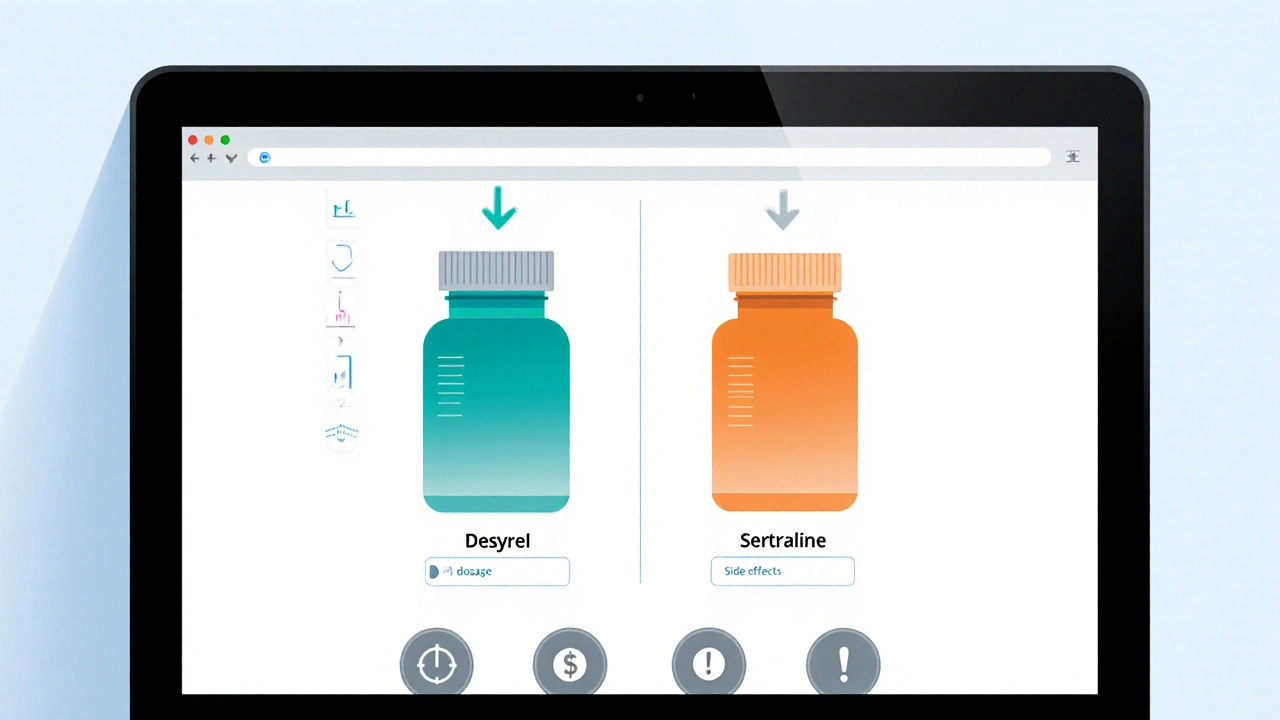Desyrel vs. Alternatives Comparison Tool
Select medications or therapies to compare their key characteristics side-by-side.
When doctors prescribe antidepressants, Desyrel is a brand name for trazodone, a serotonin antagonist and reuptake inhibitor (SARI) used to treat depression and insomnia. Many patients wonder whether another pill might work better, cause fewer side‑effects, or fit a different lifestyle. This guide lines up the most common alternatives, talks about how they stack up on efficacy, dosing, safety, and cost, and gives you a checklist to decide what makes sense for you.
Quick Take
- Desyrel works well for insomnia but can cause daytime drowsiness.
- SSRIs (sertraline, fluoxetine) are first‑line for depression, with fewer sleep‑related side‑effects.
- Mirtazapine is great for low appetite and sleep, but can increase weight.
- Bupropion boosts energy and helps with smoking cessation, but may raise anxiety.
- Amitriptyline is cheap and effective for pain, yet it has a higher risk of cardiac issues.
- Cognitive Behavioral Therapy (CBT) offers drug‑free relief for mild‑moderate depression.
- Melatonin supplements help with sleep without the drug‑interaction risks of trazodone.
How Desyrel Works - The Basics
Trazodone blocks certain serotonin receptors while modestly increasing serotonin levels. Its dual action makes it useful for two problems at once: mood and sleep. Typical adult dosing starts at 50mg at bedtime and can climb to 300mg per day, split into multiple doses if needed. Because it’s metabolized by the liver enzyme CYP3A4, it can interact with many other drugs, especially other antidepressants and antifungals.
Key Alternatives Explained
Below are the seven most frequently mentioned substitutes. Each paragraph introduces the drug (or therapy) with concise attributes - mechanism, usual dose, main use, and a quick look at side‑effects.
Sertraline is an SSRI (selective serotonin reuptake inhibitor) that boosts serotonin availability across the brain. The usual starting dose is 50mg once daily, often increased to 200mg. It’s first‑line for major depressive disorder, anxiety, and OCD. Common side‑effects include nausea, sexual dysfunction, and occasional jitteriness.
Fluoxetine also belongs to the SSRI family, with a longer half‑life that can smooth out withdrawal. Starting at 20mg daily, doctors may raise it to 60mg. It’s prescribed for depression, bulimia, and panic disorder. People often notice insomnia or appetite loss, but the drug is usually well tolerated.
Mirtazapine is a NaSSA (noradrenergic and specific serotonergic antidepressant). It works by blocking alpha‑2 receptors, which releases more norepinephrine and serotonin. Typical dose ranges from 15mg to 45mg at bedtime. It’s praised for improving sleep and appetite, yet it can cause weight gain and dry mouth.
Bupropion is an NDRI (norepinephrine‑dopamine reuptake inhibitor). Starting doses are 150mg once daily, usually increased to 300mg in divided doses. It’s effective for depression and helps smokers quit. Unlike SSRIs, it rarely causes sexual side‑effects, but it can increase anxiety or trigger seizures at high doses.
Amitriptyline is a tricyclic antidepressant (TCA) that blocks the reuptake of norepinephrine and serotonin. Low‑dose regimens (10‑25mg at night) are often used for chronic pain or migraine prophylaxis; higher doses treat depression. Side‑effects include dry mouth, constipation, and, in older adults, heart‑rhythm changes.
Cognitive Behavioral Therapy (CBT) is a structured, short‑term psychotherapy that teaches patients to identify and reframe negative thought patterns. A typical course involves 12‑20 weekly 60‑minute sessions. It has no medication side‑effects and works well for mild‑to‑moderate depression and anxiety.
Melatonin is a hormone supplement that regulates the sleep‑wake cycle. Doses range from 0.5mg to 5mg taken 30 minutes before bedtime. It improves sleep onset without the sedative rebound seen with trazodone, but it does not treat mood symptoms directly.
Side‑Effect Profile at a Glance
| Medication / Therapy | Common Side‑Effects | Rare but Serious |
|---|---|---|
| Desyrel (Trazodone) | Drowsiness, dry mouth, dizziness | Priapism, serotonin syndrome |
| Sertraline | Nausea, sexual dysfunction, insomnia | Suicidal thoughts (young adults), serotonin syndrome |
| Fluoxetine | Insomnia, anxiety, decreased appetite | QT prolongation (high doses), serotonin syndrome |
| Mirtazapine | Weight gain, sedation, increased appetite | Rare agranulocytosis, serotonin syndrome |
| Bupropion | Dry mouth, insomnia, tremor | Seizures (high doses), hypertension |
| Amitriptyline | Constipation, blurred vision, drowsiness | Cardiac arrhythmia, overdose toxicity |
| CBT | Emotional discomfort during sessions | None (non‑pharmacologic) |
| Melatonin | Drowsiness, vivid dreams | None reported at typical doses |

Cost & Accessibility
Price matters, especially in the UK where NHS prescribing varies. Generic trazodone costs about £0.12 per tablet, while sertraline and fluoxetine sit around £0.08‑£0.10. Mirtazapine and amitriptyline are similarly cheap. Bupropion is less common in the UK, often costing £0.30‑£0.40 per tablet. CBT sessions on the private market range £50‑£100 per hour; some NHS trusts offer it for free after a GP referral. Melatonin supplements are sold over‑the‑counter for roughly £5‑£10 per month.
Choosing the Right Option - A Decision Checklist
- Primary symptom? If insomnia dominates, keep trazodone or switch to mirtazapine or melatonin. For pure mood lift, consider an SSRI (sertraline, fluoxetine) or bupropion.
- Weight concerns? Avoid mirtazapine and amitriptyline; prefer sertraline, fluoxetine, or CBT.
- Sexual side‑effects? Bupropion and CBT have the lowest risk.
- Cardiac health? Stay clear of amitriptyline if you have heart rhythm issues; opt for SSRIs.
- Drug interactions? Trazodone and amitriptyline are metabolized by CYP3A4; check any concurrent meds.
- Preference for non‑drug therapy? CBT can be used alone or alongside a low‑dose medication.
- Budget? Generic SSRIs and TCAs are the cheapest; private CBT or melatonin are extra costs.
When to Stay on Desyrel
If you’re already stable on Desyrel, experience good sleep, and haven’t had serious side‑effects, there’s no urgent reason to jump ship. Tapering off should be done under medical supervision to avoid withdrawal dizziness. Keep an eye on rare issues like priapism - any prolonged erections lasting more than four hours need emergency care.
How to Talk to Your Doctor About Switching
- Prepare a symptom diary for the past two weeks - note mood scores, sleep quality, and any adverse events.
- Bring a list of all current meds, including OTC and supplements.
- Ask about the taper schedule - most doctors reduce trazodone by 25mg every week.
- Discuss which alternative aligns with your lifestyle - e.g., “I prefer a once‑daily pill without nighttime drowsiness.”
- Confirm follow‑up timing - usually a check‑in after two weeks on the new medication.
Potential Pitfalls & How to Avoid Them
Switching antidepressants can feel like a rollercoaster. The most common mistake is stopping one drug abruptly, leading to rebound insomnia or mood spikes. Another trap is under‑dosing the new medication because you expect it to work instantly - most agents need 4‑6 weeks to reach full effect. Finally, don’t ignore lifestyle factors: regular exercise, balanced diet, and sleep hygiene boost any pharmacologic plan.

Frequently Asked Questions
Can I take Desyrel with an SSRI?
Combining trazodone with an SSRI can increase the risk of serotonin syndrome, a rare but serious condition. Doctors sometimes prescribe a low dose of trazodone for sleep while the patient is on an SSRI, but they monitor closely for agitation, rapid heart rate, or high fever. Never start the combo without medical guidance.
How long does it take for an SSRI to work compared to Desyrel?
SSRIs usually need 4‑6 weeks to show full antidepressant effects, while trazodone’s sleep‑inducing action can be felt within a few days. Mood improvement may still take several weeks, just like any other antidepressant.
Is CBT enough to replace medication?
For mild‑to‑moderate depression, CBT can be as effective as a pill, especially when patients commit to homework and regular sessions. Severe depression often benefits from a combined approach - medication to stabilize chemistry, therapy to build coping skills.
What should I do if I experience priapism on Desyrel?
Priapism is a medical emergency. Seek immediate care - the longer the erection lasts, the higher the risk of permanent damage. Inform the emergency team that you’re on trazodone so they can give the appropriate treatment.
Are there any natural supplements that work like Desyrel?
5‑HTP and St. John’s Wort affect serotonin, but they have unpredictable potency and can interact dangerously with other antidepressants. Melatonin is a safer choice for sleep, but it doesn’t treat mood. Always check with a clinician before adding supplements.

15 Comments
Graham Moyer-StrattonOctober 4, 2025 AT 04:04
Trazodone is just a sedative with a fancy name. SSRIs are the real deal if you want to fix your brain not just knock yourself out. Stop chasing sleep pills like they're magic.tom charltonOctober 5, 2025 AT 03:17
The clinical distinctions presented here are both accurate and clinically significant. One must exercise due diligence when considering pharmacological alternatives, particularly given the potential for drug interactions and individual metabolic variance. A structured, evidence-based approach remains paramount.Jacob Hepworth-wainOctober 6, 2025 AT 15:26
I've been on trazodone for a year and it saved my sleep. But I switched to low-dose sertraline after my doc said my mood wasn't improving. It took 6 weeks but now I'm actually functioning. Don't give up if the first med doesn't click.king tekken 6October 8, 2025 AT 05:48
u think trazodone is bad wait till u find out the pharma giants are hiding the truth about serotonin syndrome its all about control and profit they dont want you to know melatonin is free and real and they make billions off your sleep problemsDIVYA YADAVOctober 9, 2025 AT 22:26
This is just another Western medical scam. In India we've used ashwagandha and brahmi for centuries to treat depression and insomnia. Why are you all blindly trusting Big Pharma's toxic chemicals when Ayurveda has proven solutions? The FDA is corrupt and the WHO is in their pocket. Wake up.Kim ClapperOctober 11, 2025 AT 02:01
I find it deeply concerning that this article casually recommends melatonin as a 'safe' alternative. Have you considered the unregulated nature of the supplement industry? The purity, dosage, and even the actual presence of melatonin in these products is often unverified. This is irresponsible.Bruce HennenOctober 12, 2025 AT 14:29
You missed the most critical point: trazodone's metabolite mCPP is a serotonergic agonist that contributes to its anxiolytic effects. Most clinicians don't understand this. SSRIs don't produce mCPP. That's why trazodone works for anxiety-related insomnia where SSRIs fail.Jake RuhlOctober 14, 2025 AT 04:31
so like i was reading this and i thought wait a minute what if all these meds are just making us dumber like what if depression is just your soul screaming for you to stop living in this matrix and go live in the woods and eat berries and meditate for 8 hours a day like why are we so obsessed with chemical fixes when the real cure is disconnecting from the systemChuckie ParkerOctober 16, 2025 AT 04:25
CBT is overrated. If you're clinically depressed you need a chemical reset not some therapist asking you to journal your feelings. Trazodone and amitriptyline work because they hit the brain hard. Stop pretending talk therapy is a substitute for pharmacology.Michael SegbawuOctober 16, 2025 AT 12:32
I tried bupropion for a month and it made me feel like a robot on caffeine. No sex drive? Good. But my heart was racing at 3am and I almost hit a tree driving to work. Trazodone at 50mg put me to sleep without turning me into a zombie. I'm sticking with it.Michelle N AllenOctober 17, 2025 AT 15:26
This is just a list. No one talks about how hard it is to get your doctor to switch you. They act like you're being difficult if you don't want to take the same pill for 10 years. I asked for mirtazapine because I couldn't eat and they just upped my trazodone. So much for patient-centered care.Madison MaloneOctober 18, 2025 AT 04:56
I've been on sertraline for 8 months and I still feel like I'm underwater. My therapist suggested adding low-dose trazodone at night just for sleep and it changed everything. I'm not cured but I can breathe again. It's not about one magic pill it's about stacking small wins.Craig HartelOctober 19, 2025 AT 23:20
As someone who grew up in a culture where mental health was never discussed, I'm grateful this exists. I showed this to my mom and she finally understood why I'm not just 'lazy'. Thanks for breaking it down without jargon. This is what real education looks like.Chris KahanicOctober 20, 2025 AT 07:45
The cost data is useful but incomplete. In rural America, even $0.10 per pill is a barrier if you're on SSDI. Pharmacy discount cards and patient assistance programs are often more relevant than generic pricing. Also, CBT access is nonexistent in 80% of counties.Geethu EOctober 21, 2025 AT 00:48
I'm a nurse in Mumbai and we use trazodone for elderly patients with dementia-related insomnia. It's cheap and works. But we also use yoga and light therapy. Western medicine ignores holistic care. You don't need a pill for every symptom. Sometimes just a walk at sunset helps more than any drug.